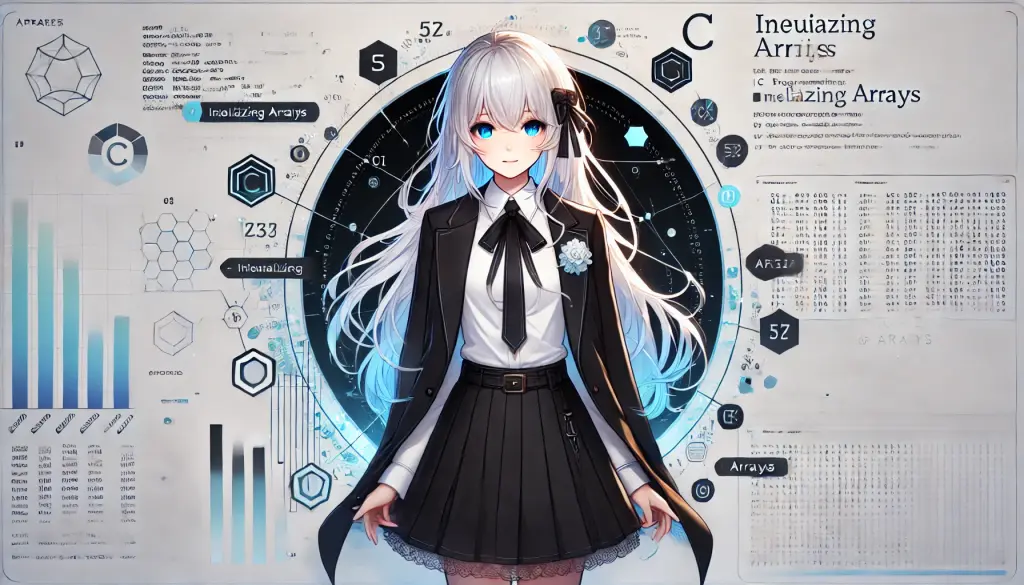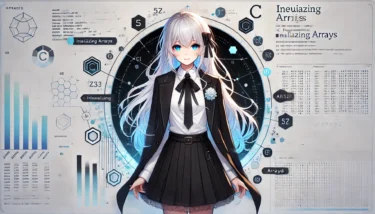目次
1. Introduction
The C language is an essential subject for programming beginners, yet many learners find it “difficult.” This perception often comes from C’s unique characteristics and concepts that are unfamiliar to novices. In this article, we will explore why C is considered difficult and suggest effective learning strategies. Along with practical advice and learning resources for beginners and intermediate learners, we will show how to deepen your understanding of C and study more efficiently. In the next section, we will look into the specific reasons why C is often called a “difficult” programming language.2. Why C is Considered Difficult
Compared to other high-level languages, C has unique learning challenges. Below are the main reasons explained in detail.2.1 The Concept of Pointers
One of the biggest hurdles for beginners in C is pointers. A pointer is a mechanism that allows direct manipulation of memory addresses. Since this concept is rarely emphasized in higher-level languages, beginners often struggle to understand it. Example:int a = 10;
int *p = &a;
printf("%d\n", *p); // Output: 10p stores the address of variable a and accesses its value through that address. Because it requires awareness of memory operations, pointers can be confusing for beginners.2.2 The Complexity of Memory Management
In C, you must manually allocate and free dynamic memory. Failing to usemalloc or free properly can result in memory leaks or segmentation faults. Common mistake:int *ptr = (int*)malloc(sizeof(int) * 10);
// Forgot to free the memory2.3 Strict Syntax Rules
C has very strict syntax rules. Missing even a single semicolon can cause the entire program to fail. Common error:#include <stdio.h>
int main() {
printf("Hello World")
return 0;
}printf statement results in a compilation error.2.4 Low Level of Abstraction
C is considered a low-level language compared to others. Since it operates close to memory and CPU operations, you may need specific hardware knowledge. For example, array manipulation and bitwise operations often require hardware-oriented thinking, which can be a high barrier for beginners.3. The Importance of Learning C
While C may seem “difficult,” it plays a crucial role in building a strong foundation in programming. In this section, we explain the importance of learning C and how its knowledge can be applied across other fields and programming languages.3.1 Applicability to Other Programming Languages
C provides the foundation for many modern programming languages. Languages like C++, Java, and Python all incorporate C-based concepts and syntax. Understanding C makes learning these languages smoother. Examples:- C++: Built on C with added object-oriented features.
- Java: Automates memory management, but the core syntax is very similar to C.
- Python: A high-level language that can integrate with C modules for performance.
3.2 Foundation for System Development
C plays a critical role in system and embedded development. For example, the Linux kernel and IoT devices often rely heavily on C. Real-world examples:- Linux Kernel: The core of one of the world’s most widely used operating systems is written in C.
- Embedded Systems: Used in consumer electronics and automotive software where resources are limited.
- Game Development: Game engines (e.g., Unreal Engine) use C/C++ at their core.
3.3 Enhancing Problem-Solving Skills
Learning C develops not only programming skills but also logical thinking and problem-solving abilities. Since C requires awareness of memory management and low-level operations, it helps you build the ability to understand programs at their core. Benefits:- Error-solving ability: Debugging memory leaks or segmentation faults strengthens your problem detection skills.
- Efficient programming: You learn to write resource-conscious, optimized code.
4. Tips and Strategies for Learning C
It’s true that many parts of C feel “difficult” to learners, but with the right study methods and strategies, you can overcome these challenges. In this section, we’ll explain practical tips for learning C more effectively.4.1 Set Clear Learning Goals
Before starting, it’s important to define specific goals. Having clear objectives helps you prioritize and stay efficient in your studies. Example goals:- Short-term goal: Master C’s basic syntax in one month.
- Mid-term goal: Build a small program (e.g., a calculator app) within three months.
- Long-term goal: Reach a level where you can use C in system development or competitive programming.
4.2 Use Recommended Resources
Leveraging books and online resources can accelerate your understanding. Here are some useful study materials: Recommended books:- “Dokushu C” (Self-Study C): A comprehensive book for beginners to intermediates with examples and exercises.
- Udemy: Offers plenty of video-based C programming courses.
4.3 Practice Through Hands-On Coding
Programming is best learned by writing code. Once you grasp the basics, move on to practical exercises. Suggested practice projects:- Beginner: Create a “Number Guessing Game” or a simple calculator.
- Intermediate: Develop a “Text File Management Tool” or a lightweight notepad app.
- Advanced: Build a “Mini Database Management Program” or a basic game engine.
- GitHub: Explore C projects created by other developers for inspiration.
4.4 Build Consistent Study Habits
To make steady progress, integrate C learning into your daily routine. Even short sessions every day can help you deepen your understanding. Habit tips:- Dedicate 30–60 minutes daily to study.
- Record what you’ve learned in a journal or blog to reinforce memory.
- Review your progress regularly and celebrate milestones.

5. Frequently Asked Questions (FAQ)
While studying C, beginners and intermediate learners often share common concerns. This section answers some frequently asked questions about learning C.Q1. Is C more difficult than other programming languages?
A. The difficulty depends on your goals and background, but C is considered more challenging than many higher-level languages. Concepts like pointers and manual memory management often become learning barriers. In contrast, Python or Java are more abstract and easier for beginners. However, learning C provides a solid foundation that makes other languages easier to master in the long run.Q2. Can I learn C through self-study?
A. Yes, you can learn C on your own. However, because of its steep learning curve, the following strategies are helpful:- Leverage study resources: Books, online courses, and YouTube tutorials.
- Focus on practice: Build small programs as you learn.
- Join communities: Forums and mentors can provide valuable support.
Q3. How long does it take to learn C?
A. It varies depending on your target level, but here are general estimates:- Basic knowledge (syntax, simple programs): 1–3 months
- Intermediate skills (pointers, memory management): 3–6 months
- Professional-level skills: 1 year or more
Q4. What projects are recommended for C beginners?
A. Choose projects that reinforce the basics:- Number Guessing Game: Generate a random number and let the user guess it.
- Calculator: Implement basic arithmetic operations.
- Text-Based Notepad: Save and retrieve notes from a file.
Q5. Which language should I learn after C?
A. It depends on your goals:- C++: Ideal if you want to expand into object-oriented programming.
- Python: Great for data analysis, machine learning, and AI.
- Java: Suitable for enterprise software or web applications.
Q6. What jobs use C programming?
A. C is widely used in:- Embedded systems: Consumer electronics, automotive systems, IoT devices.
- Systems programming: Operating systems, drivers, and low-level tools.
- Game development: Performance-critical areas of game engines.
6. Conclusion
Many learners find C difficult, but overcoming these challenges builds highly valuable skills. The knowledge and techniques you gain can give you a strong advantage in other programming languages and system development.Why Learning C Matters
Studying C goes beyond mastering one language. The skills you gain will benefit your career and projects for years to come:- Deep understanding of how computers work through memory and pointer operations.
- Practical use in hardware-related fields like Linux kernels and embedded systems.
- A solid foundation that makes learning other languages easier.
Key Study Points
Using the strategies covered in this article will help you learn more efficiently:- Set clear goals and learn step by step.
- Use recommended resources to build your foundation.
- Work on projects to apply what you’ve learned.
- Ask questions in communities or from mentors when stuck.




